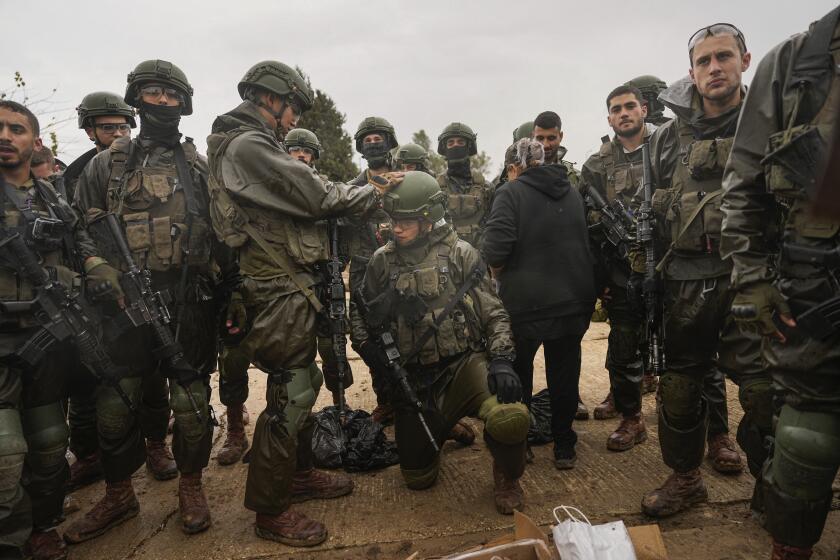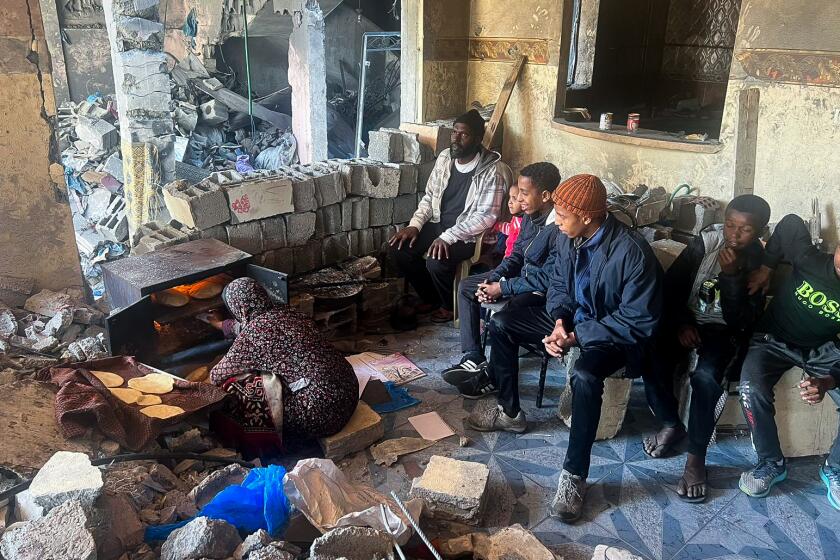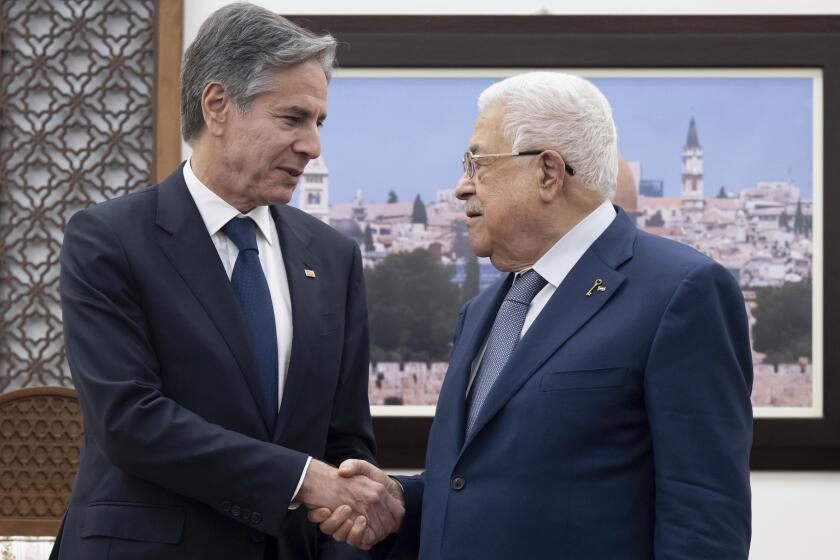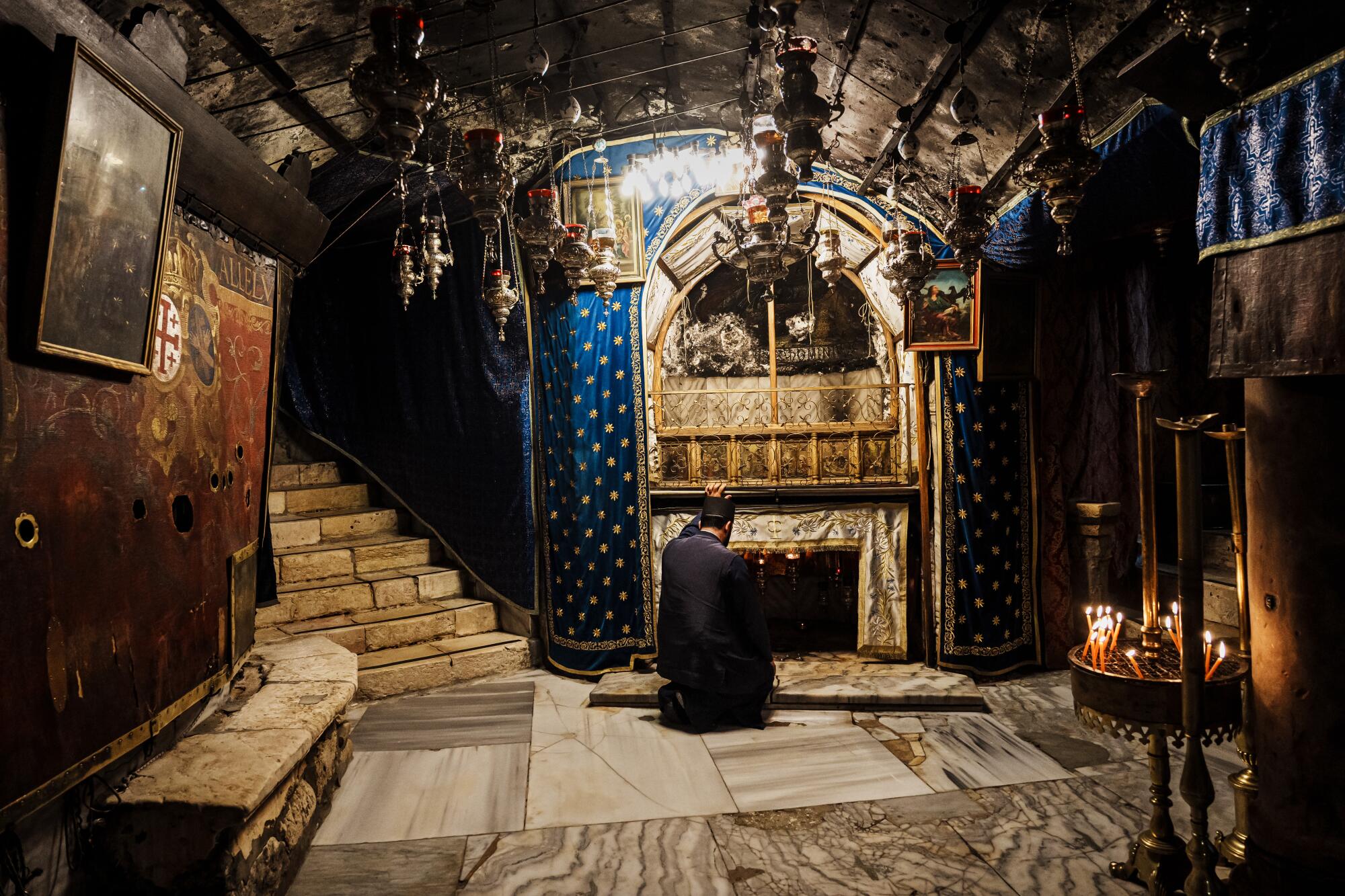
- Share via
BETHLEHEM, West Bank — It isn’t subtle. Nor is it intended to be.
Instead of a pastoral-looking Nativity scene, the creche features baby Jesus wrapped in a checkered Palestinian kaffiyeh, surrounded by jagged chunks of stone — evoking bombed-out buildings in the Gaza Strip and children buried beneath them.
“I see God in the rubble,” said Munther Isaac, the Palestinian pastor of a landmark Lutheran church in Bethlehem, the West Bank town revered by Christians as Jesus’ birthplace. “And Christ was born under occupation.”
Together with parishioners, he created the wartime tableau, which will remain in place at the church through the Christmas season. The image is a jarring one, Isaac acknowledges — but cannot come close to summing up the daily horrors taking place only 45 miles distant, in Gaza.
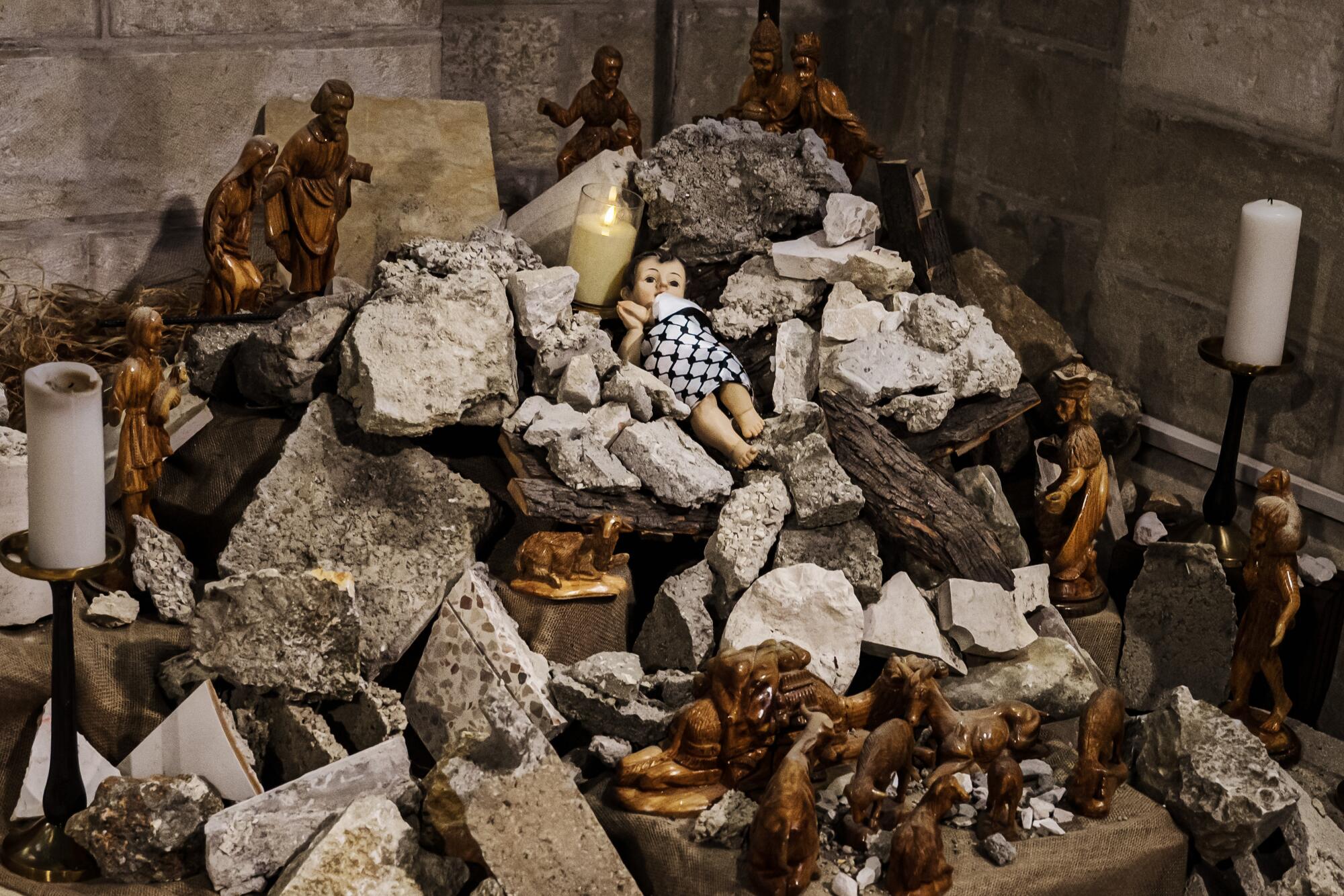
Palestinian Christians, a fast-dwindling minority in the Holy Land, are marking an especially somber Christmas this year, canceling holiday festivities in an expression of solidarity with compatriots as Israel’s war on the Palestinian militant group Hamas grinds on.
In this third month of Israeli bombardment of Gaza, coupled with a wide-ranging ground offensive — both launched after Hamas attackers killed hundreds of Israelis in their homes and at an open-air dance festival — the death toll inside the crowded coastal enclave stands at more than 19,000, about two-thirds of them women and children, according to Palestinian officials.
This moment in the Israel-Hamas saga can be glimpsed in the fate of two fathers, strangers who share misfortunes brought on by larger powers and are now left to find their way
In Bethlehem, where many local Christians have relatives in Gaza, the Christmas holiday will be marked by prayers, church services and the annual procession of Christian patriarchs — but the more joyous traditional trappings are being eschewed. No twinkling Christmas lights, no lavishly decorated tree in Manger Square, no festive parade with marching bands.
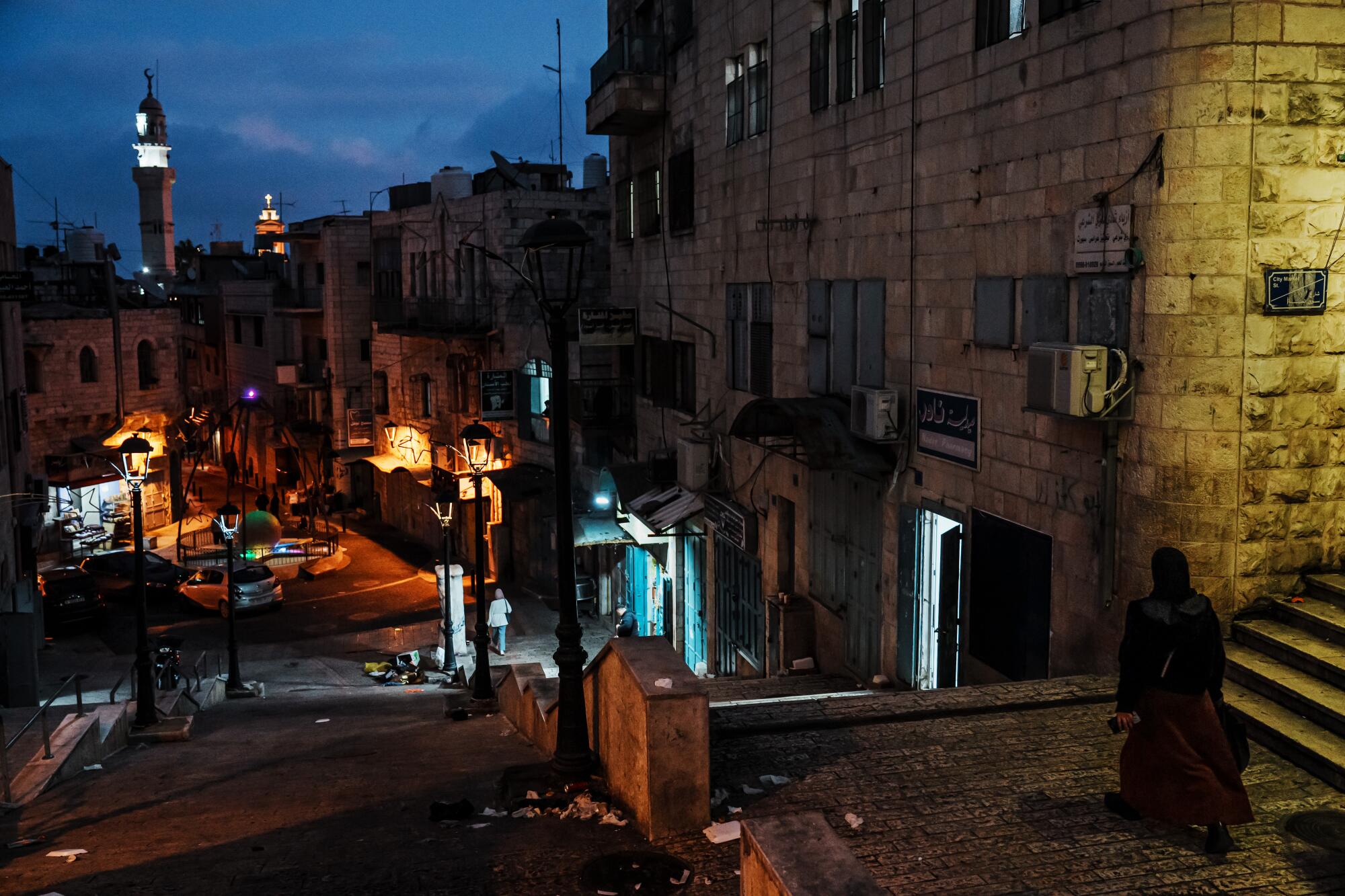
“How could we celebrate?” asked the town’s mayor, Hanna Hanania, whose office overlooks a nearly deserted Manger Square. The flagstone plaza facing the Church of the Nativity, a pilgrimage site for Christians the world over, is usually bustling at this time of year, but most of the souvenir shops and restaurants lining it are tightly shuttered.
Bethlehem, where once-majority Christians now make up fewer than one-fifth of the town’s population of some 30,000, is a microcosm of the West Bank’s woes. Checkpoints hem it in, and the stony terraced hills — where shepherds watched their flocks by night, as the traditional Christmas carol has it — are transversed by a hulking Israeli security barrier.
Surrounded by Jewish settlements, the town is home to two Palestinian refugee camps that seethe with unrest and are regularly raided by Israeli troops.
After Hamas’ attack, the U.S. pledged full support for Israel. Now, as the death toll in Gaza skyrockets, President Biden is trying to rein in Netanyahu.
“It’s not the little town of the Bible anymore,” said the Rev. Mitri Raheb, president of Bethlehem’s Dar al-Kalima University. At 61, he remembers when the unobstructed view from his nearby family home was a mountainside that turned green in spring rains. Now it is topped by a settlement, one of nearly 150 in the West Bank, which are considered illegal under international law.
For Palestinian Christians, the current war marks a catastrophe embedded within a catastrophe: the potential eradication of what was already a minuscule Christian presence in Gaza. Numbering fewer than 1,000 out of a population of more than 2 million, the community’s wartime losses are disproportionately felt.
Many Bethlehem-area Christians have relatives in Gaza, and are terrified for their safety.
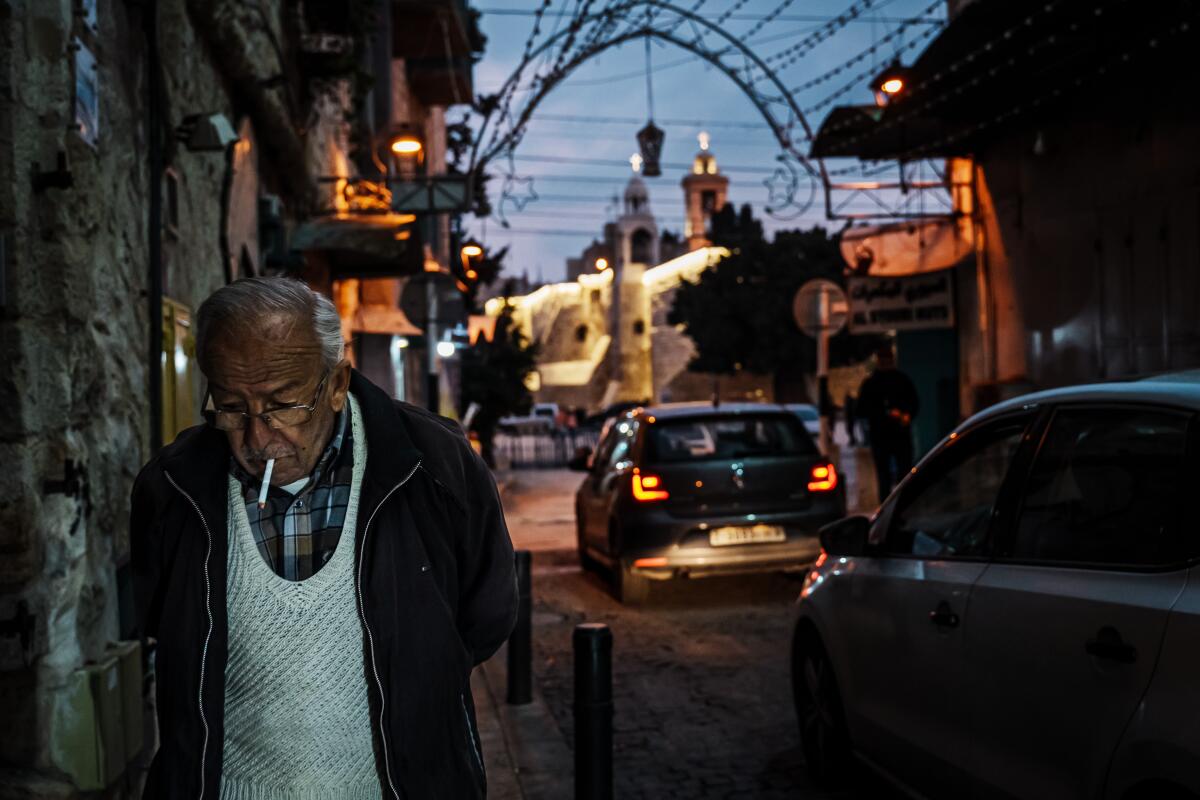
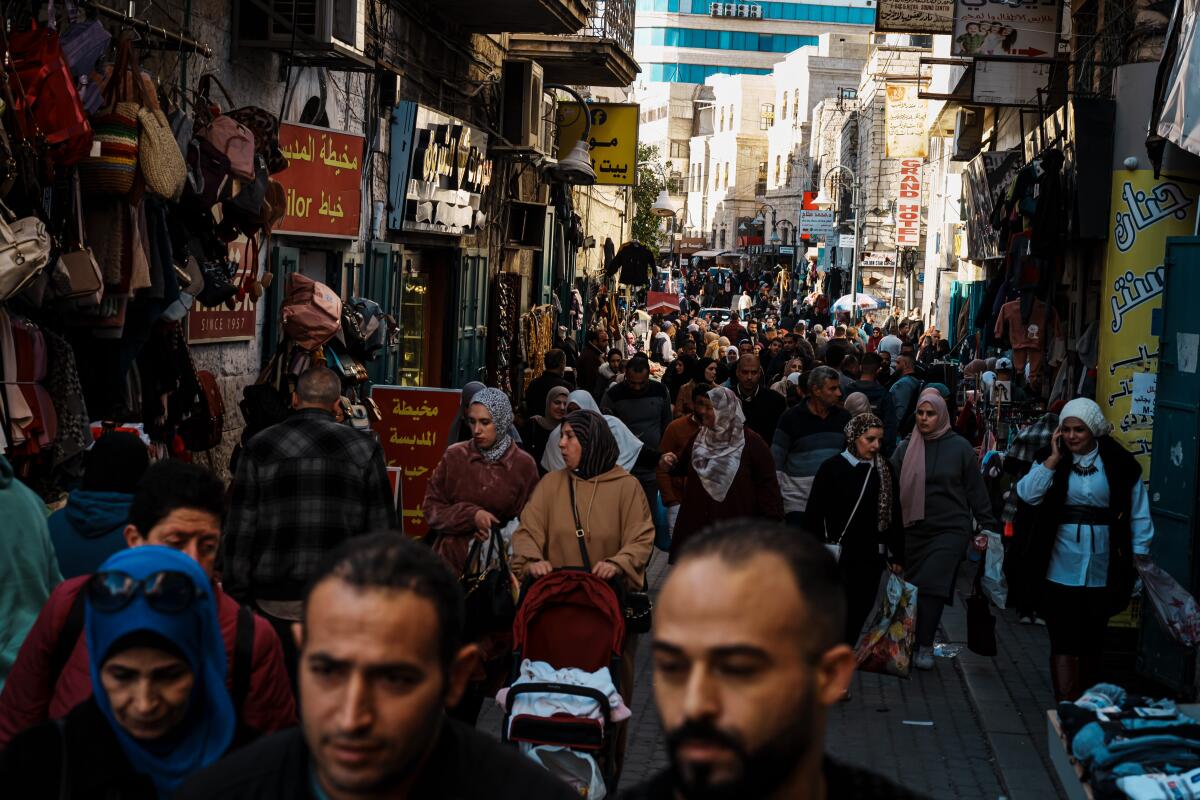
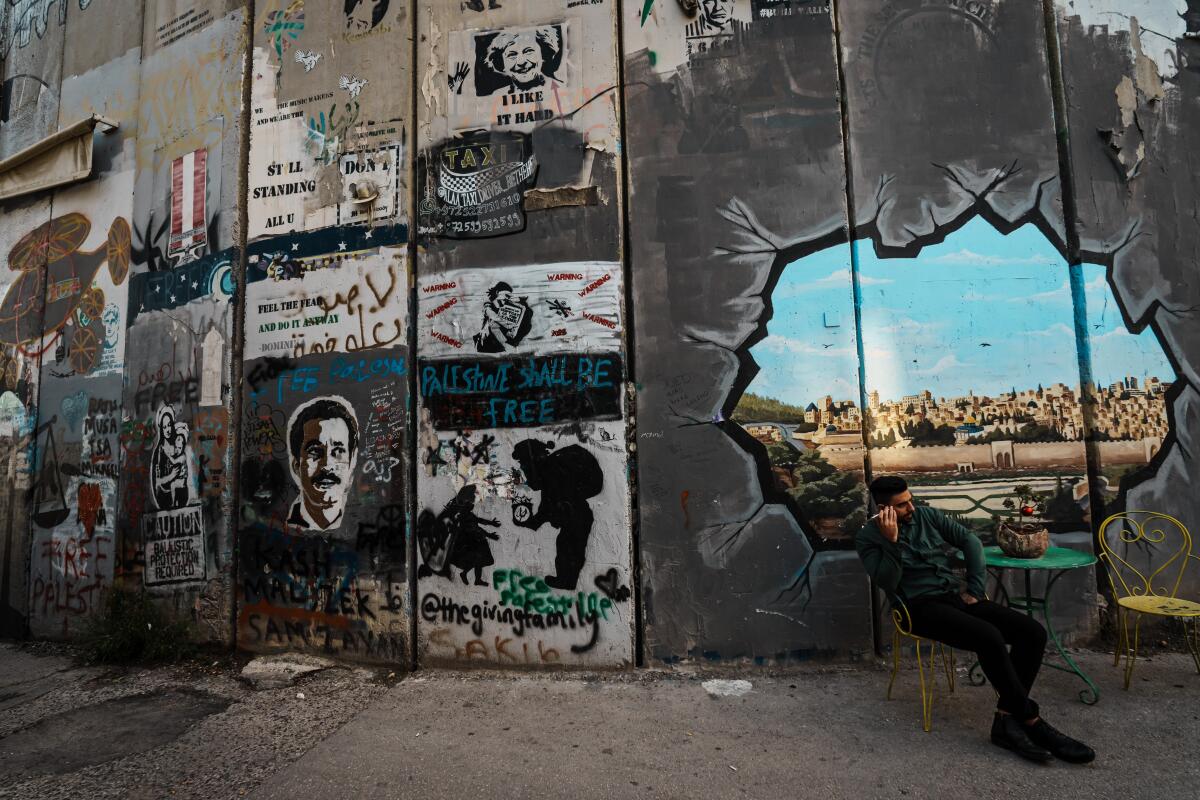
1. A man walks through the Old City near the Church of Nativity in Bethlehem. 2. People crowd a busy market street in Bethlehem. 3. A man sits by a mural on a wall separating Bethlehem from Jerusalem. (Marcus Yam / Los Angeles Times)
An outbuilding of Gaza City’s oldest working church, St. Porphyrius, was hit by Israeli bombardment in October, killing at least 16 of the hundreds of people sheltering there, according to Palestinian officials. Former U.S. Rep. Justin Amash, a Palestinian American, posted anguished social-media accounts about several Christian relatives killed or maimed in the strike.
“Our family is hurting badly,” the Michigan Republican-turned-independent wrote on X, formerly Twitter. “May God watch over all Christians in Gaza — and all Israelis and Palestinians who are suffering, whatever their religion or creed.”
Last weekend, two Christian women sheltering at a Roman Catholic church compound in Gaza City were killed by Israeli sniper fire, the Latin Patriarchate in Jerusalem said. Relatives identified them as a mother and daughter — Naheda Anton, 71, and her daughter, Samr Anton, 58 — and said that after the older woman was hit, her daughter tried to pull her to safety, and was shot as well.
Jawdat Hanna Mikhail, the grandson of one slain woman and the nephew of the other, said several other family members inside the Holy Family compound tried to reach the pair, and were shot and wounded themselves.
“Snipers are deployed around the church,” said Mikhail, 27, who lives in Beit Sahur, just outside Bethlehem. “Nobody can move.”
Pope Francis condemned the killing of the women. A British member of Parliament, Layla Moran, has been posting on social media about members of her extended family, including 11-year-old twins, also trapped in the complex.
“I’m now no longer sure they are going to survive until Christmas,” she told the BBC.
Some longtime monitors of Christian demographic trends say that after years of hardship, the small and struggling community in Gaza stands on the verge of extinction.
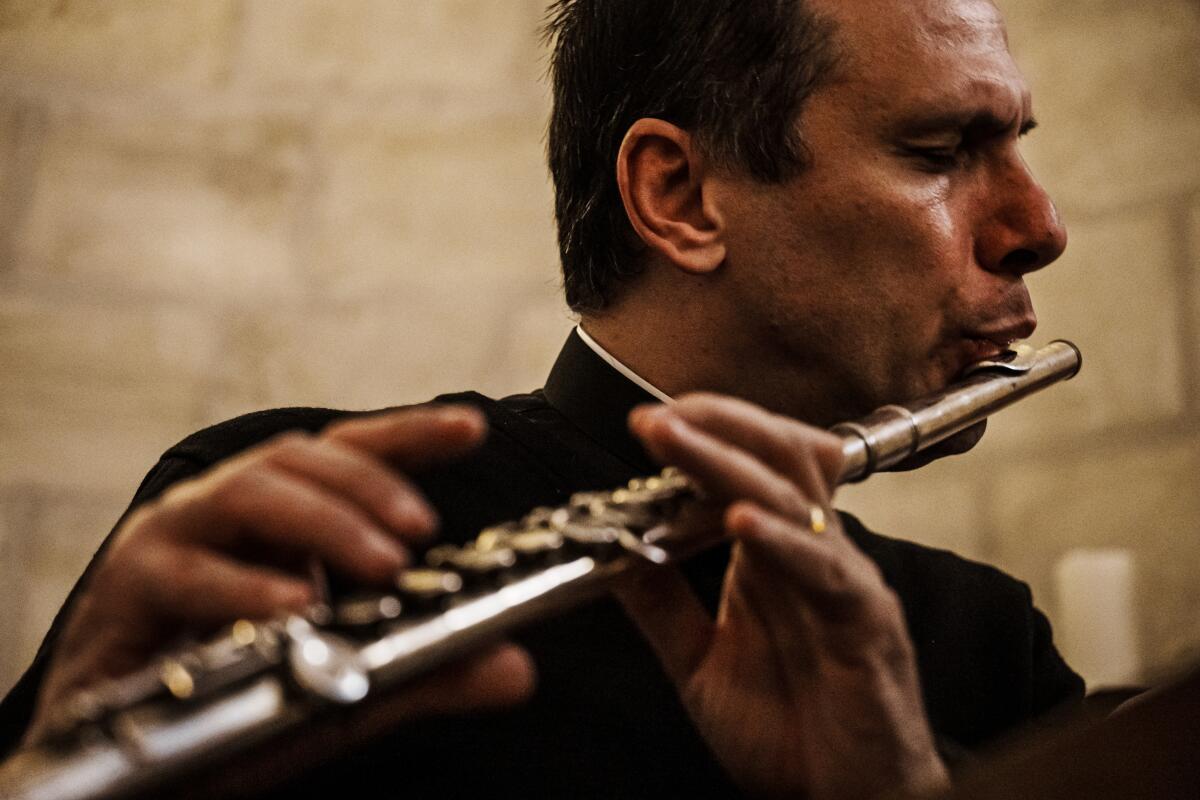
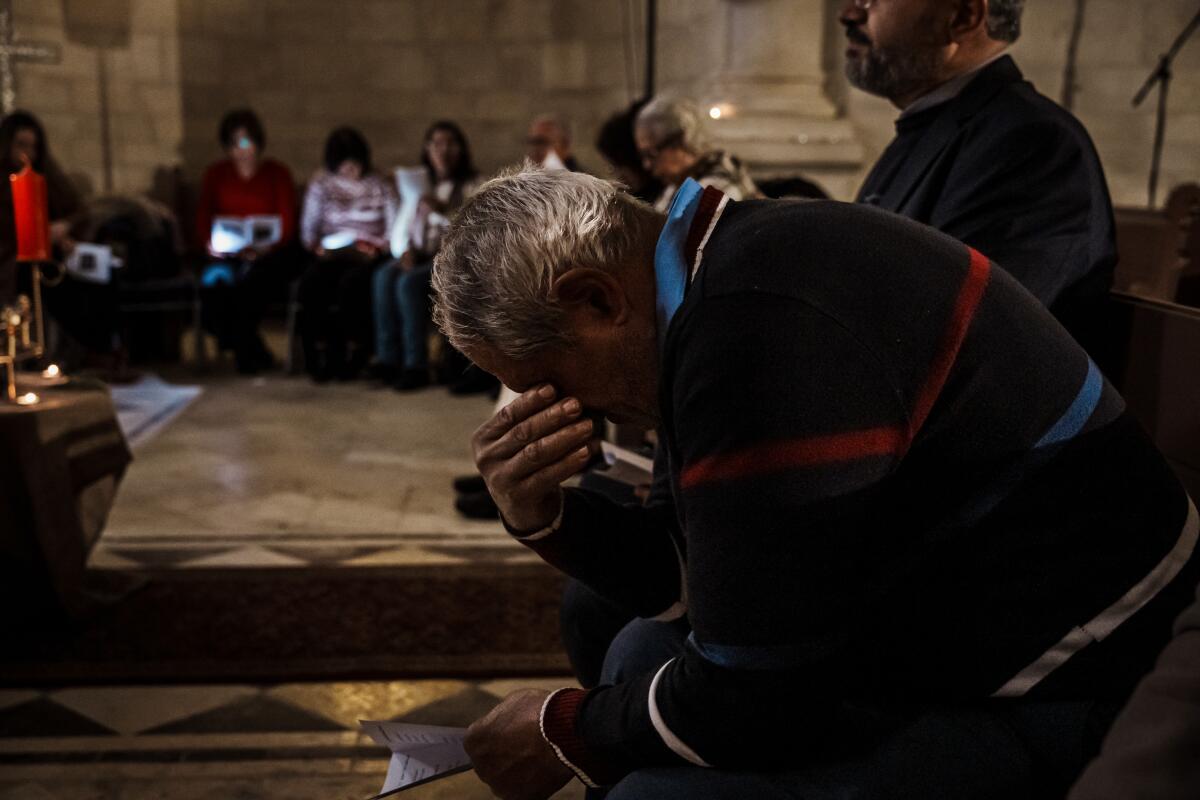
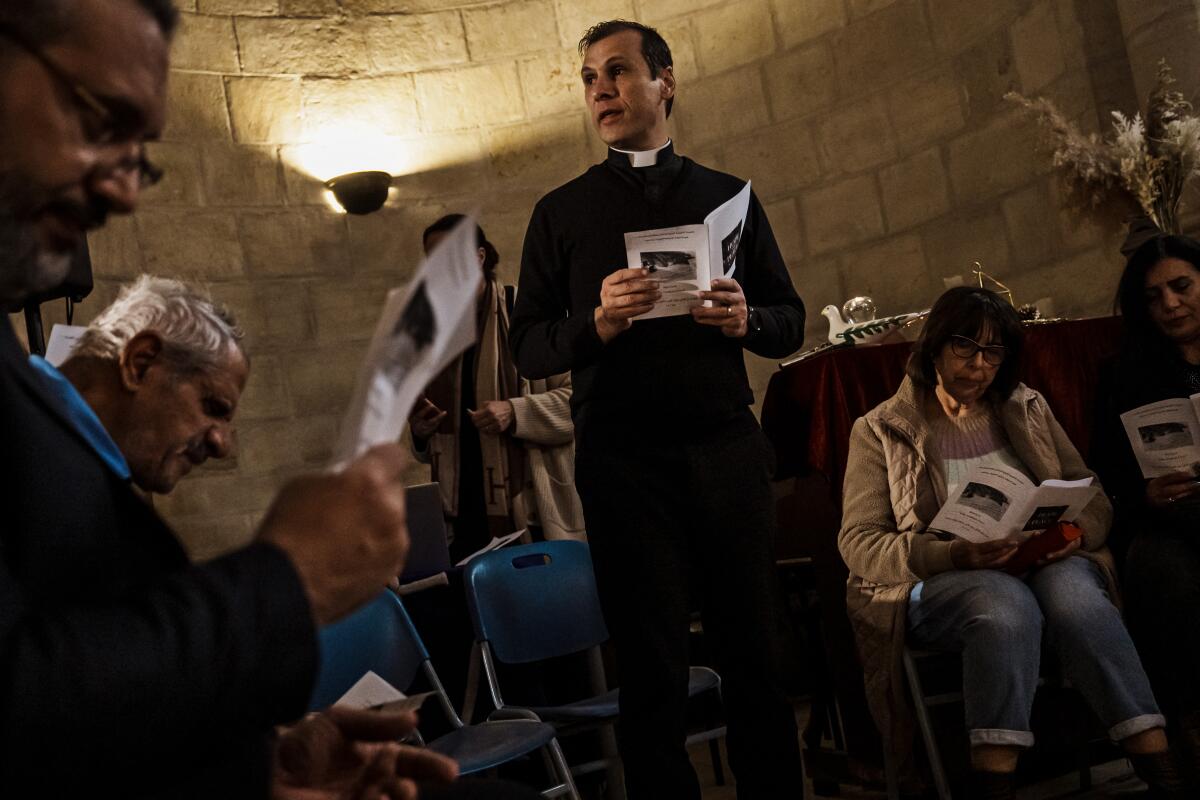
1. The Rev. Munther Isaac plays the flute at a landmark Lutheran church in Bethlehem. 2. Daher Nassar lowers his head to pray. 3. The Rev. Munther Isaac leads singing and prayers for the victims in Gaza. (Marcus Yam / Los Angeles Times)
“I fear that this war will be the end of the Christian presence in Gaza,” said Raheb, the college president. “It is a bleeding wound.”
The surging violence also points up the complex internal interplay in the occupied Palestinian territories between Christians and the overwhelming Muslim majority. Recent surveys suggest Hamas’ popularity among Palestinians in both the West Bank and Gaza is running higher despite — or because of — the devastating Oct. 7 cross-border attack on Israel that precipitated the war.
‘I just don’t know where we’ll go.’ It’s a question Palestinians ask over and over in Gaza as Israel ramps up bombardment after Hamas truce collapsed.
Gaza’s Christian population numbered about 3,000 when Hamas took over the narrow Mediterranean strip in 2007; about two-thirds of them left in the intervening years, before the start of this war.
Although generally wealthier and better educated than the population as a whole, Christians in Gaza endured or were driven out by the same privations as other Palestinians — raging unemployment, lack of opportunity, periodic battles between Israel and Hamas. But they were also chilled by the unsolved slaying, in the early days of Hamas rule, of a prominent Christian bookstore manager who had been threatened before his death by jihadist groups.
In Bethlehem, a decree from the West Bank’s governing Palestinian Authority mandates that the city’s mayor, deputy mayor and a majority of the municipal council must be Christians. Prior to that, a coalition backed by Hamas, which functions as a political movement in addition to its armed wing, held a council majority, the mayor said.
“They are our neighbors,” he said.
At the Church of the Nativity, the ancient limestone basilica venerated by Christians as marking the place of Christ’s birth, hard times have helped dampen tensions between the three Christian sects that share control of its premises.
In past years, jurisdictional clashes over nooks and crannies in the church’s dim, incense-scented recesses had sometimes boiled over into physical altercations.
Father Issa Thaljieh, a 40-year-old Greek Orthodox parish priest at the Church of the Nativity, said there was relative harmony among the sects now, their disputes vastly overshadowed by the war.
Father Issa, born and raised in Bethlehem, said that from boyhood on, he felt the powerful pull of spiritual wonder associated with not only the basilica but the town itself, even as the ongoing conflict with Israel disfigured the biblical landscape surrounding Bethlehem.
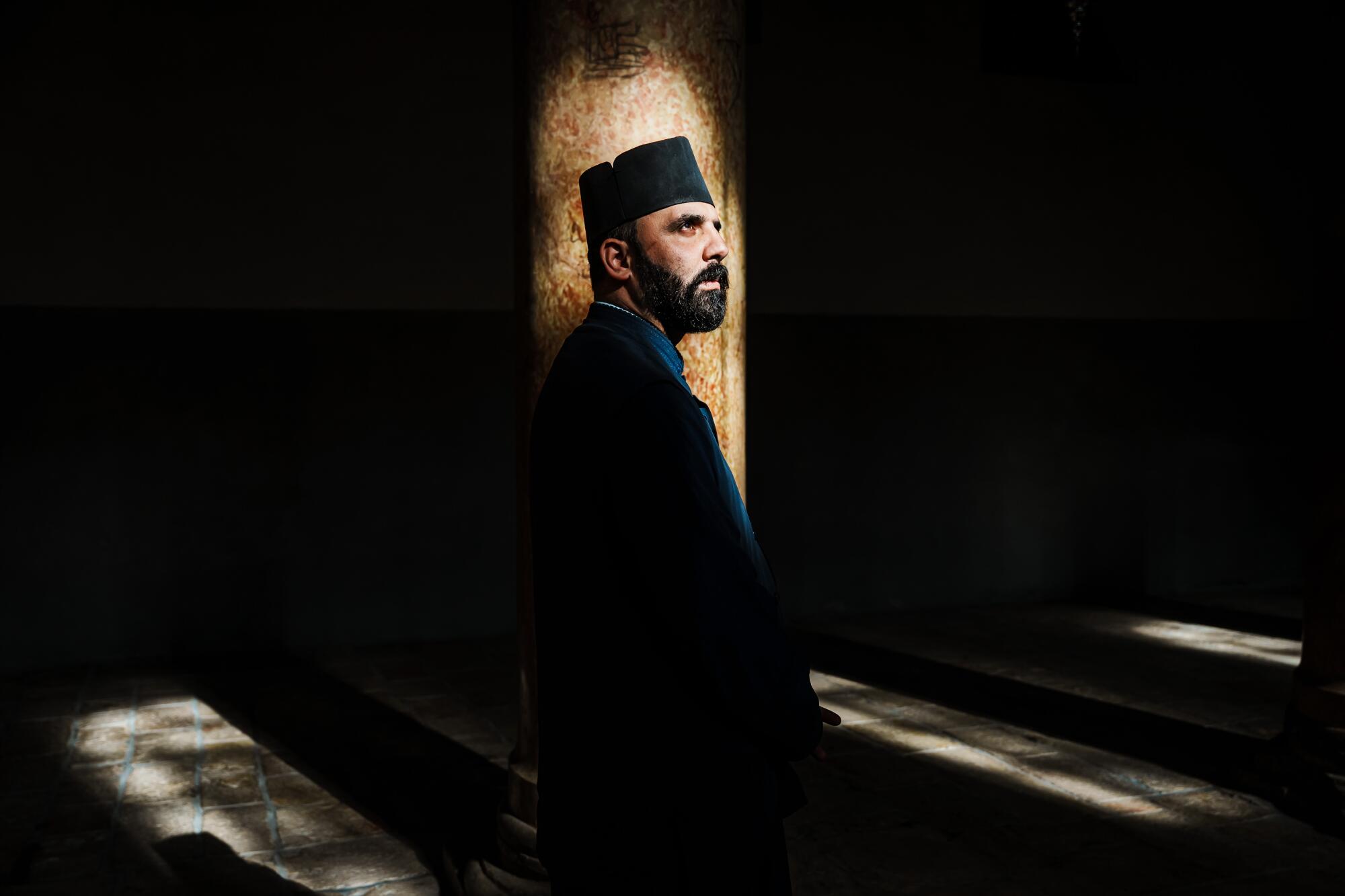
Though he could live and work elsewhere, he said he feels a call of duty to stay and minister to his shrinking flock.
Deep grief over death and destruction in Gaza pervades the holiday, the priest said, but he also saw this season as a beacon of much-needed hope.
“These are very, very sad times,” he said. “But the message of Bethlehem and the message of Christmas, which is the message of peace, is more important than ever.”
The Biden administration views the two-state solution — an independent Palestinian state alongside Israel — as the only way to stop generations of violence.
More to Read
Sign up for Essential California
The most important California stories and recommendations in your inbox every morning.
You may occasionally receive promotional content from the Los Angeles Times.

